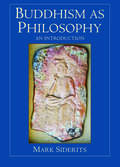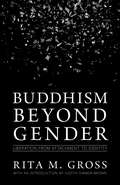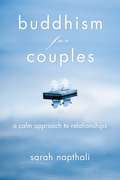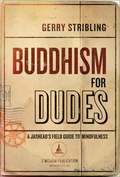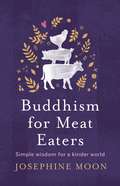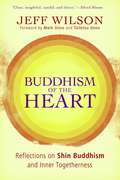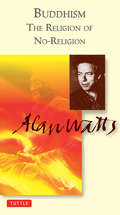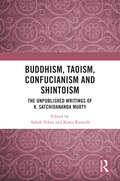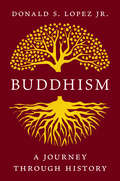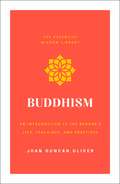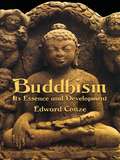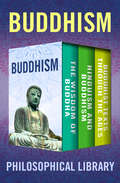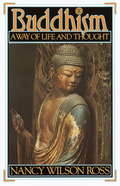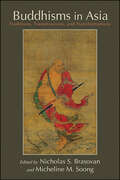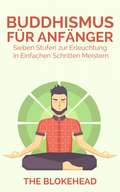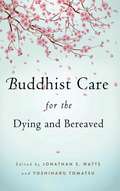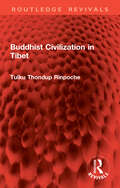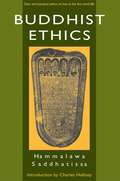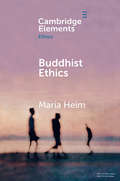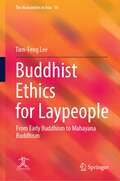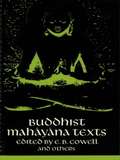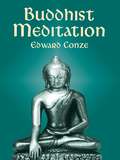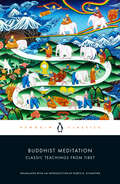- Table View
- List View
Buddhism as Philosophy: An Introduction
by Mark SideritsIn this clear, concise account, Siderits makes the Buddhist tradition accessible to a Western audience, offering generous selections from the canonical Buddhist texts and providing an engaging, analytical introduction to the basic tenets of Buddhist thought.
Buddhism beyond Gender: Liberation from Attachment to Identity
by Rita M. Gross Judith Simmer-BrownA bold and provocative work from the late preeminent feminist scholar, which challenges men and women alike to free themselves from attachment to gender. At the heart of Buddhism is the notion of egolessness—“forgetting the self”—as the path to awakening. In fact, attachment to views of any kind only leads to more suffering for ourselves and others. And what has a greater hold on people’s imaginations or limits them more, asks Rita Gross, than ideas about biological sex and what she calls “the prison of gender roles”? Yet if clinging to gender identity does, indeed, create obstacles for us, why does the prison of gender roles remain so inescapable? Gross uses the lenses of Buddhist philosophy to deconstruct the powerful concept of gender and its impact on our lives. In revealing the inadequacies involved in clinging to gender identity, she illuminates the suffering that results from clinging to any kind of identity at all.
Buddhism for Couples
by Sarah NapthaliLearn Buddhist principles that can help enrich your romantic life, your life in general, and the lives of those around you.Surely a happy marriage for a normally adjusted couple is a simple matter of give-and-take--some patience, tolerance, and just trying to be cheerful as often as possible. There is no shortage of books providing relationship advice that can help us with these matters. But Buddhist teachings address more than just surface knowledge, and guide us to delve deeper into our psyches.With an emphasis on self-compassion, Buddhism for Couples explains how to apply Buddhist teachings to your relationships to patch things up, hold things together, and, even on good days, scale the heights of relationship happiness. Written for both men and women, this book tackles the loaded subjects of housework, anger, sex, conflict, and infidelity, and introduces Buddhist strategies that can enrich a relationship.Humorous and informative, Buddhism for Couples provides a fresh approach to living as a couple, persuading us to leave behind stale, habitual ways of relating that don't work.From the Trade Paperback edition.
Buddhism for Dudes
by Gerry StriblingA tough former Marine leads Buddhist basic training for the average Joe.In Buddhism for Dudes, Gerry "Strib" Stribling, former Marine and all-around good guy, answers questions on life and living with a healthy dose of Buddhist wisdom for the regular guy. Strib takes a good look at who the Buddha was, meditation, karma, and more. With good humor and without sentimentalism, he explains these down-to-earth insights in everyday language. Showing how Buddhism boldly approaches life's problems head on, unflinching and alert--like a soldier in a forward listening post in the dark of night--Strib emphasizes the Buddhist call to moral action for the good of oneself and others.
Buddhism for Meat Eaters: Simple Wisdom for a Kinder World
by Josephine MoonFor many years Josephine Moon struggled with the question of eating meat, fervently wishing to live as a vegetarian yet requiring meat in her diet. From Josephine’s philosophical, spiritual and physical battle with eating meat came, Buddhism for Meat Eaters – a book for animal lovers, the environmentally and ethically conscious, and generally thoughtful people who eat meat but perhaps aren’t entirely comfortable doing so. Open, honest and utterly without judgement, Buddhism for Meat Eaters encourages readers to be more mindful about their choices, rather than berating themselves for them, and offers ways for people to live ethically, honestly and guilt-free, whether as a carnivore, vegetarian or vegan. This highly practical guide also includes workbook-style activities and topics for consideration to guide you in your own journey to making wiser decisions on how you consume, how you live, and how to change the world around you.
Buddhism of the Heart
by Taitetsu Unno Jeff Wilson Mark UnnoJeff Wilson started his walk on the Buddha's path as a Zen practitioner - taking up a tradition of vigorous self-effort, intensive meditation, and meticulous attention to rectitude in every action. But in Jeff's case, rather than freeing him from his suffering, he found those Zen practices made him nothing short of insufferable. And so he turned to Shin Buddhism - a path that is easily the most popular in Zen's native land of Japan but is largely unknown in the West. Shin emphasizes an "entrusting heart," a heart that is able to receive with gratitude every moment of our mistake-filled and busy lives. Moreover, through walking the Shin path, Jeff comes see that each of us (himself especially included) are truly "foolish beings," people so filled with endlessly arising "blind passions" and ingrained habits that we so easily cause harm even with our best intentions. And even so, Shin holds out the tantalizing possibility that, by truly entrusting our foolish selves to the compassionate universe, we can learn to see how this foolish life, just as it is, is nonetheless also a life of grace. Buddhism of the Heart is a wide-ranging book of essays and open-hearted stories, reflections that run the gamut from intensely personal to broadly philosophical, introducing the reader to a remarkable religious tradition of compassionate acceptance.
Buddhism the Religion of No-Religion
by Alan WattsIn this dynamic series of lectures, Alan Watts takes us on an exploration of Buddhism, from its roots in India to the explosion of interest in Zen and the Tibetan tradition in the West. Watts traces the Indian beginnings of Buddhism, delineates differences between Buddhism and other religions, looks at the radical methods of the Mahayan Buddhist, and reviews the Four Noble Truths and The Eightfold Path.
Buddhism, Taoism, Confucianism and Shintoism: The Unpublished Writings of K. Satchidananda Murty
by Ashok Vohra and Kotta RameshK. Satchidananda Murty (1924-2011) was a vociferous writer and an iconoclast. This volume is a collection of his unpublished writings in philosophy. It features Murty's essays on Buddhism, Taoism, Confucianism and Shintoism. The texts study the origins of Indian, Chinese, and Japanese philosophical traditions and provide a comparative study of the different schools of thought. Murty analyses the development of science in the ancient Indian tradition, especially in the areas of geometry, algebra, architecture, engineering, and astronomy. He also provides recommendations for promoting Asian philosophies and cultures to the world, without dependence on the West. An important contribution, the book presents K. Satchidananda Murty's contribution to philosophy during sixty-one years of his engagement with active writing and teaching. It will be of great interest to scholars, teachers, and students of Indian philosophy, Hindu philosophy, comparative philosophy, Asian Philosophy, religious studies, and South Asian studies.
Buddhism: A Journey through History
by Donald S. LopezOne of the world’s leading scholars of Buddhism presents the story of its dramatic journey across the globe, from 2,500 years ago to the present day Over the course of twenty-five centuries, Buddhism spread from its place of origin in northern India to become a global tradition of remarkable breadth, depth, and richness. In this ambitious book, Donald S. Lopez Jr. draws on the latest scholarship to construct a detailed and innovative history of Buddhism—not just as a chronology through the centuries or as geographic movement across a map, but as a dense matrix of interconnections. Beginning with the life and teachings of the Buddha, Lopez shows how a set of evolving ideas and practices traveled north and east to China, Korea, Japan, Mongolia, and Tibet, south and southeast to Sri Lanka, Burma, Thailand, Cambodia, Laos, Vietnam, and Indonesia, and finally westward to Europe and the Americas. He provides insights on questions that Buddhism has asked and answered in different times and different places—about apocalypse, art, identity, immortality, law, nation, persecution, philosophy, science, sex, war, and writing. Vast in its erudition and expansive in its vision, this is the most complete single‑volume history of Buddhism in its full historical and geographical range.
Buddhism: An Introduction to the Buddha's Life, Teachings, and Practices (The Essential Wisdom Library) (The Essential Wisdom Library)
by Joan Duncan OliverA modern guide to the teachings of Buddhism Buddhism: An Introduction to the Buddha’s Life, Teachings, and Practices is an indispensable guide to a 2,600-year-old wisdom tradition that has transformed the lives of millions across centuries and around the world. Readers will learn how Siddhartha Gautama became the Buddha, one of the most influential spiritual leaders of all time, and discover how they too can follow his revolutionary methods to attain happiness and inner freedom. Along with accessible overviews of central teachings—the Four Noble Truths, the Eightfold Path, karma, core virtues like kindness and compassion, and more—Buddhism covers such basics as:- the three main Buddhist traditions—Theravada, Mahayana, and Vajrayana—historically and their relevance today- the role of meditation and mindfulness in Buddhist practice- step-by-step instruction in key Buddhist practices Writing in an engaging, approachable style, author Joan Duncan Oliver outlines the fundamentals of Buddhism for every reader, revealing its timeless truths and their relevance for finding peace in uncertain times. A practitioner of Buddhist meditation for forty years, Oliver has written extensively on Buddhist wisdom and its application to daily life. Her practical approach makes Buddhism an essential modern guidebook to an ancient tradition.
Buddhism: Bullet Guides
by Paul OliverOpen this book and you will Discover Buddha's teachings Gain awareness Apply Buddhist beliefs Become enlightened
Buddhism: Its Essence and Development
by Edward ConzeBased on a series of Oxford lectures delivered by a leading Buddhist scholar, this classic guide covers the entire range of Buddhist thought, including spirituality, doctrine, and basic assumptions.An expert on the subject who converted to Buddhism in the course of his studies. Dr. Conze introduces Buddhism as both religion and philosophy, and discusses its common ground with other faiths throughout the world. He contrasts monastic and popular Buddhism and defines old and new schools of thought, discussing sects and their practices, moral wisdom, and literary history. Other subjects include the Yogacarins; the Tantra, or magical Buddhism; and developments in the faith beyond India.The first comprehensive English-language book on Buddhism, this volume offers a concise approach to the complexities of Buddhist thought. A preface by a distinguished scholar of Oriental literature, Arthur Waley, appears in this edition.
Buddhism: The Wisdom of Buddha, Hinduism and Buddhism, and Buddhist Texts Through the Ages (From Buddhism To Sufism Ser.)
by Edward Conze Ananda K. Coomaraswamy Philosophical LibraryThis curated collection of primary texts and secondary scholarship offers an engaging and comprehensive view of Buddhism and its founder.The Wisdom of Buddha: Drawn from the sacred books of Buddhism, this collection reveals the core insights and beliefs of the world&’s fourth-largest religion. It covers the birth and death of the Buddha, as well as the major tenets of Buddhism, including karma and the middle doctrine. Hinduism and Buddhism: A highly original discussion of the origins and tenets of the great Eastern religions by a Sri Lankan theorist who introduced ancient Indian art to the West. Buddhist Texts Through the Ages: A comprehensive collection of Buddhist texts and scriptures translated from the original Pali, Sanskrit, Chinese, Tibetan, and Japanese. This edition also includes a glossary of English and foreign terms.
Buddhism: Way of Life & Thought
by Nancy Wilson Ross"A clear, exhilarating exposition of the Buddhist way, well understood, well made, fun to read, and simple in the very best sense of the word—just as it should be!" —Peter Matthiessen, National Book Award Winner of In ParadiseA fascinating volume that explains the origins, development and basic principles of the religion followed by nearly one-quarter of the people on earth.
Buddhisms in Asia: Traditions, Transmissions, and Transformations (SUNY series in Asian Studies Development)
by Nicholas S. Brasovan; Micheline M. SoongOver its long history, Buddhism has never been a simple monolithic phenomenon, but rather a complex living tradition—or better, a family of traditions—continually shaped by and shaping a vast array of social, economic, political, literary, and aesthetic contexts across East Asia, South Asia, and Southeast Asia. Written by undergraduate educators, Buddhisms in Asia offers a guide to Buddhism's rich variety of traditions and cultural expressions for educators who would like to include Buddhism in their undergraduate courses. It introduces fundamental yet often underrepresented Buddhist texts, concepts, and material in their historical contexts; presents the major "ecologies" of Buddhist belief, practice, and cultural expression; and provides methodological insights regarding how best to infuse Buddhist content into undergraduate courses in the humanities and social sciences. The text aims to represent "Buddhisms" by approaching the subject from a broad range of disciplinary perspectives, including art history, anthropology, history, literature, philosophy, religious studies, and pedagogy.
Buddhismus für Anfänger: Sieben Stufen zur Erleuchtung In einfachen Schritten meistern
by The BlokeheadDieses Buch leitet Sie leicht und problemlos in die Praktiken des Buddhismus ein. In simplen und leichten Schritten wird beschrieben, wie sie zur Erleuchtung gelangen können.
Buddhist Care for the Dying and Bereaved
by Jonathan S. Watts Yoshiharu TomatsuSince its beginning, Buddhism has been intimately concerned with confronting and understanding death and dying. Indeed, the tradition emphasizes turning toward the realities of sickness, old age, and death - and using those very experiences to develop wisdom and liberating compassion. In recent decades, Buddhist chaplains and caregivers all over the world have been drawing on this tradition to contribute greatly to the development of modern palliative and hospice care in the secular world at large. Specifically Buddhist hospice programs have been further developing and applying traditional Buddhist practices of preparing for death, attending the dying, and comforting the bereaved. Buddhist Care for the Dying and Bereaved contains comprehensive overviews of the best of such initiatives, drawn from diverse Buddhist traditions, and written by practitioners who embody the best of contemporary Buddhist hospice care programs practiced all over the world today. Contributors include Carl B. Becker, Moichiro Hayashi, Yozo Taniyama, Mari Sengoku, Phaisan Visalo, Beth Kanji Goldring, Caroline Prasada Brazier, Joan Jiko Halifax, and Julie Chijo Hanada.
Buddhist Civilization in Tibet (Routledge Revivals)
by Tulku Thondup RinpocheFirst published in 1987, Buddhist Civilization in Tibet is unique among works in English as it provides a whole range of information on Tibetan religion and literature, with extensive scholarly data, in a compact single volume. An invaluable reference book, it shows what is available within different traditions and literature, and what will be helpful for English-speaking students who are interested in Tibetan Buddhism, its culture and literature.In the first part of the book, the author provides a survey of Buddhism in Tibet, and an account of the doctrine and history of the four major Buddhist schools of Tibet—Nyingma, Kagyud, Sakya and Gelug—with lists of their major monastic institutions. In the second part, he gives an overview of Tibetan literature, with a summary of both the secular and religious literature of Tibet, and particular emphasis on the scope of literary works of the four major Buddhist schools.
Buddhist Ethics
by Charles Hallisey Venerable Hammalawa Saddhatissa"For more than a quarter of a century, those in search of an introduction to Buddhist moral thought have turned and returned to this little volume..." Thus notes Charles Hallisey of Harvard University in his introduction. Starting with an examination of classical Greek notions of ethics, Venerable Saddhatissa goes on to explain the development of Buddhist moral codes and their practical application. In this work, Venerable Saddhatissa starts with an examination of Western notions of ethics, beginning with the early Greek philosophers and moving on to show us how the study of morality is crucial to a clear understanding of the Buddhist tradition. Drawing on a vast array of Buddhist scriptures, Venerable Saddhatissa explains the development and position of Buddhist precepts from a traditional perspective, while simultaneously offering clear and practical advice on how best to live the moral life of a lay Buddhist practitioner. Throughout Buddhist Ethics, Venerable Saddhatissa always keeps us in touch with the pragmatic uses of Buddhist moral practices, not only as a way to live in harmony with the world, but as an indispensable aspect of the path to the Buddhist's highest spiritual goal.
Buddhist Ethics (Elements in Ethics)
by Maria Heim'Ethics' was not developed as a separate branch of philosophy in Buddhist traditions until the modern period, though Buddhist philosophers have always been concerned with the moral significance of thoughts, emotions, intentions, actions, virtues, and precepts. Their most penetrating forms of moral reflection have been developed within disciplines of practice aimed at achieving freedom and peace. This Element first offers a brief overview of Buddhist thought and modern scholarly approaches to its diverse forms of moral reflection. It then explores two of the most prominent philosophers from the main strands of the Indian Buddhist tradition – Buddhaghosa and Śāntideva – in a comparative fashion.
Buddhist Ethics for Laypeople: From Early Buddhism to Mahayana Buddhism (The Humanities in Asia #10)
by Tien-Feng LeeThis book comprehensively discusses the topics in Buddhism that are crucial for promoting lay people’s welfare—from mundane bliss in this life, i.e., wealth and good interpersonal relationships, to prosperity in the future, i.e., a good rebirth and less time spent in Samsara. This book presents some moral guidelines and a spiritual training path designed for householders and lay Buddhists, helping them secure the welfare. The guidelines and the training path presented in the book are based on the Pali Nikāyas and the Chinese Āgamas in Early Buddhism and an influential Chinese Mahayana scripture—the Upāsakaśīla Sūtra
Buddhist Ethics: A Philosophical Exploration (Buddhist Philosophy for Philosophers Series)
by Jay L. GarfieldBuddhist Ethics presents an outline of Buddhist ethical thought. It is not a defense of Buddhist approaches to ethics as opposed to any other, nor is it a critique of the Western tradition. <p><p>Garfield presents a broad overview of a range of Buddhist approaches to the question of moral philosophy. He draws on a variety of thinkers, reflecting the great diversity of this 2500-year-old tradition in philosophy but also the principles that tie them together. In particular, he engages with the literature that argues that Buddhist ethics is best understood as a species of virtue ethics, and with those who argue that it is best understood as consequentialist. Garfield argues that while there are important points of contact with these Western frameworks, Buddhist ethics is distinctive, and is a kind of moral phenomenology that is concerned with the ways in which we experience ourselves as agents and others as moral fellows.
Buddhist Mahayana Texts
by Francis A. Davis E. B. CowellBasic documents in Mahayana Buddhism, highly important in history of religions. The Buddha-karita of Asvaghosha, Larger Sukhavativyuha, more.
Buddhist Meditation (Routledge Library Editions: Buddhism Ser.)
by Edward ConzeAs prayer is to the Christian life, so meditation is the very heart of Buddhist life. This introduction explains the meaning and purpose of meditation. Its series of devotional exercises include instructions on maintaining mental and physical awareness during meditation, with advice on postures, breathing, repudiation of the sensory world, and more.
Buddhist Meditation: Classic Teachings from Tibet
by Kurtis R. SchaefferA Tibetan Buddhist anthology of accessible and authentic contemplative exercises to help cultivate innate yet undeveloped powers of mind, emotion, and body. A Penguin Classic Drawn from Tibet's rich contemplative literature, Buddhist Meditation offers classic exercises focused on the opportunities and challenges of life; cultivating inner calm; fostering a wider perspective on oneself in relationship to others; working with negative emotions, and the highest values of the Buddhist tradition, love and compassion. Several dozen meditation instructions are collected in twelve chapters. All major traditions of Tibetan Buddhism are represented. The book is structured on "foundation practices", practice manuals that immerse the reader in the search for meaningful and compassionate responses to the ubiquity of human suffering, and in the contemplative techniques that translate that search into consequential action. Spiritual exercises introduce 1) the opportunity for self-betterment and to be of benefit to other living beings; 2) the inescapable persistence of suffering in life, and the reality of death; 3) the workings of ethical cause and effect, otherwise known as karma; and 4) the ever-repeating succession of frustration known as cyclic existence, or samsara. The second set of foundation practices provide tools to build upon including: 5) taking refuge in Buddhism—a deep formal commitment to integrate Buddhist contemplative and ethical teachings into one's life; 6) cultivating love and compassion for all living beings; 7) clearing away cognitive, emotional, and behavioral impediments to actualizing love and compassion; 8) developing with wisdom and the experience and excellent qualities necessary to put love and compassion into practice; and 9) dedicating oneself to a spiritual mentor to serve as a guide through this intensive program of training. Part existential philosophy, part ethics, part self-help program, part cosmology—the foundation exercises present a complete Buddhist picture of life, the ethical universe, and the first steps in making a positive impact in life for ourselves and others, steps anyone can begin to take by dedicating themselves to train in contemplative exercises.
